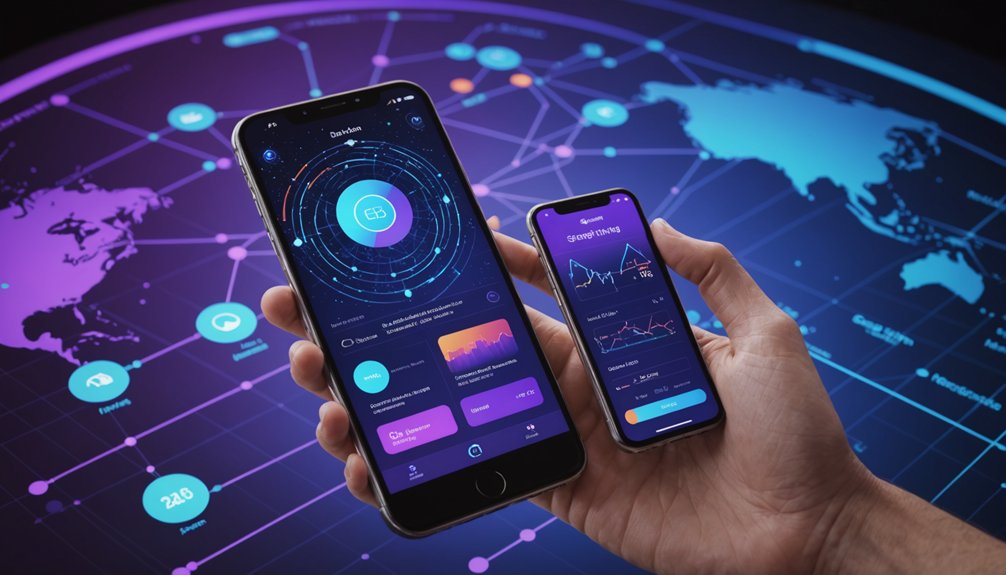AI transforms marketing from reactive to proactive engagement by delivering hyper-targeted messages to specific audiences at ideal times. It analyzes mountains of customer data, predicts needs before customers realize them, and customizes messaging for individual preferences. Companies using AI personalization enjoy higher conversion rates, more efficient resource allocation, and enhanced customer loyalty. Those not embracing this technology? They’re basically dinosaurs waiting for the meteor. The competitive edge AI offers isn’t just significant—it’s becoming essential for survival.

While traditional marketing casts a wide net and hopes for the best, AI-driven personalization delivers laser-focused messages to exactly the right people at precisely the right time. It’s not rocket science—it’s actually more sophisticated. Companies leveraging AI for personalization are seeing dramatic improvements in customer engagement and loyalty. Their secret? Algorithms that actually understand what customers want before they do.
The future isn’t just predicting customer needs—it’s fulfilling them before customers even recognize them themselves.
These AI systems analyze mountains of data, turning seemingly random clicks and purchases into predictive gold mines. Scary good at it, too. They’re constantly learning, adjusting, and optimizing marketing campaigns in real-time. No more waiting weeks to see if a campaign flopped. Now you know immediately. Send time optimization ensures messages reach audiences when they’re most likely to engage.
The competitive advantage is undeniable. Brands using AI personalization are leaving their competitors in the digital dust. Higher conversion rates. Better sales figures. More efficient resource allocation. Why waste money showing ads to people who couldn’t care less?
Behind the scenes, the technology is impressive. Predictive analytics forecasts future behaviors. Machine learning algorithms tailor messages to individual preferences. Recommendation systems suggest products customers actually want, not just what needs to be cleared from inventory. And natural language processing powers those eerily helpful chatbots. AI transforms the brand-consumer relationship from a reactive stance to proactive engagement through data-driven insights.
The applications are everywhere. Loyalty programs that don’t feel generic. Gamified experiences that keep customers clicking. Content that magically changes based on who’s viewing it. Cross-selling opportunities that don’t make customers roll their eyes. Like modern recruitment tools, these systems use machine learning to create personalized experiences based on individual profiles and preferences.
Of course, it’s not all algorithmic sunshine. Data privacy concerns loom large. Regulatory compliance isn’t optional. And the quality of data matters—garbage in, garbage out, as they say. The foundation of successful personalization is built on having accurate, real-time data that reflects genuine customer behaviors and preferences.
Companies serious about competing are already building customer data platforms and scaling their AI initiatives. Starting small, monitoring results, adjusting strategies. The winners will be those who embrace this technology while respecting customer boundaries.
Let’s be real: AI isn’t just enhancing marketing—it’s revolutionizing it. Those not on board are already falling behind. And they probably don’t even realize it yet.
Frequently Asked Questions
What Privacy Concerns Arise With Ai-Driven Personalized Marketing?
AI-driven personalized marketing raises serious privacy concerns. Extensive data collection can feel invasive to consumers.
Companies face hefty fines for non-compliance with GDPR and CCPA regulations. Data breaches expose sensitive information, potentially devastating for customers. Trust evaporates quickly when data is misused.
Many businesses lack transparency about how they collect and use personal information. The line between helpful personalization and creepy surveillance is thin. Really thin.
Privacy isn’t optional—it’s expected.
How Do Small Businesses Implement AI Marketing With Limited Budgets?
Small businesses can jump on the AI bandwagon without breaking the bank.
They’re using free versions of tools, focusing on specific high-impact areas first—typically customer service or social media management. No need for fancy tech degrees either; most platforms are surprisingly user-friendly.
They’re starting small, measuring results, then scaling up. Budget-friendly options like chatbots and content generators deliver quick wins.
The smart ones integrate these tools with existing systems. Competitors still using spreadsheets? Too bad for them.
Can AI Marketing Alienate Customers Through Excessive Personalization?
Yes, AI marketing can definitely alienate customers through excessive personalization. When algorithms cross the invisible line from helpful to creepy, consumers bolt.
Studies show over 80% of people worry about their data being used without consent. Too many targeted ads? Customers tune out. Wrong-time communications? They get annoyed.
The “uncanny valley” of marketing happens when brands know too much. Balance matters. Some personalization works wonders; too much feels like stalking. Simple as that.
What Skills Do Marketers Need to Effectively Utilize AI Tools?
Marketers need a Swiss Army knife of skills to wrangle AI effectively.
Data analysis? Non-negotiable. They’ve got to interpret what the machines spit out.
Prompt engineering separates the pros from the amateurs – garbage in, garbage out.
Domain knowledge remains vital; AI doesn’t replace industry expertise.
Statistical understanding helps evaluate if campaigns actually work.
And adaptability? Essential. The tools change monthly, sometimes weekly.
Those who can’t evolve get left behind. Simple as that.
How Is ROI Measured for AI Personalization Investments?
ROI for AI personalization gets measured through several key metrics.
Customer lifetime value, conversion rates, and retention rates top the list. Companies track NPS and customer satisfaction scores too.
The numbers don’t lie—AI personalization delivers 5-8 times ROI on marketing spend and can boost sales by 10%.
Real-time tracking lets marketers make immediate adjustments. Attribution models help pinpoint exactly which touchpoints actually matter.
Pretty straightforward stuff, really.




